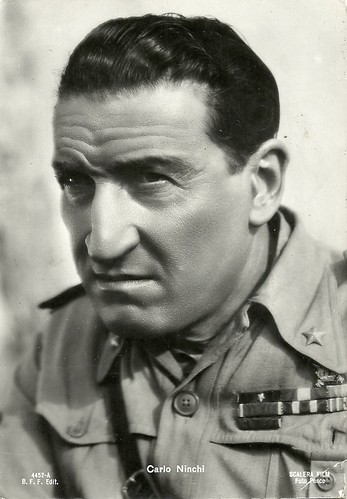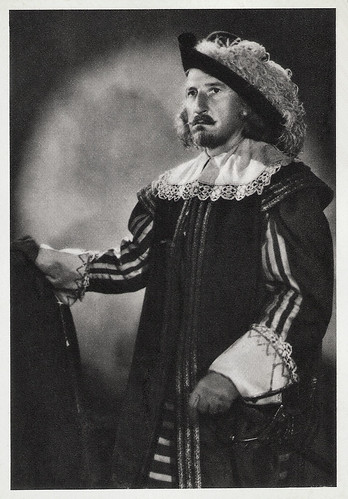Carlo Ninchi (1896-1974) was an Italian stage and screen actor, who appeared in almost 130 Italian films between the 1930s and 1960s. He was the younger brother of Annibale Ninchi and a cousin of Ave Ninchi.

Italian postcard by B.F.F. Edit (Ballerini & Fratini Editori), Firenze, no. 4452-A. Photo: Pesce / Scalera Film. Carlo Ninchi in Giarabub (Goffredo Alessandrini, 1942).
Carlo Ninchi was born in Bologna, Italy in 1896.
He debuted in the theatre company of his brother Annibale Ninchi, as Pilades in Alfieri’s Orestes. From then on, he was engaged by the major Italian stage companies, where he shared the stage with such other future great actors as Paolo Stoppa and Gino Cervi.
From the start of the Italian sound cinema in 1930 he acted in films. He alternated leads with supporting parts, starting with Corte d’Assise/Before the Jury (Guido Brignone 1930) with Marcella Albani. It was followed by Terra madre/Mother Earth (Alessandro Blasetti, 1931) with Leda Gloria.
He was Hagenbach opposite Germana Paolieri’s Wally in La Wally (Guido Brignone, 1931), and Compare Alfio in Cavalleria rusticana (Amleto Palermi, 1939), both films based on famous operas. In the latter film he acted opposite Isa Pola and the sex symbol of the fascist regime, Doris Duranti.
Also in 1939 he acted in Mario Soldati’s romantic comedy Dora Nelson as a rich industrial whose runaway wife, a spoiled actress, is substituted on the set but also in private by a lookalike (a double role by Assia Noris). The husband finally dumps his diva and marries the simple girl.
During the war years Ninchi, who had already acted in the fascist propaganda film Camicia nera/Black Shirt (Giovacchino Forzano, 1933), alternated propaganda films such as the colonial film Giarabub (Goffredo Alessandrini, 1942) and the anti-Soviet film Odessa in fiamme/Odessa in Flames (Carmine Gallone, 1942) with modern drama, romantic comedy and historical films, such as Catene invisibili/Invisible Chains (Mario Mattoli, 1942) and Stasera niente di nuovo/Nothing New Tonight (Mario Mattoli, 1942), both starring Alida Valli.
Ninchi acted opposite Maria Mercader in La porta del cielo/Heaven's Gate (Vittorio De Sica, 1945) and opposite Elio Parvo in Roberto Rossellini’s Desiderio (1943-46). Ninchi also played the tormented ‘Innominato’ in the Manzoni adaptation I promessi sposi/The Spirit and the Flesh (1941), directed by Mario Camerini and staged with great productive resources (the Milan Duomo as it looked like in 1627 was reconstructed on the studio lot) and a supercast.

Italian postcard by S.A. Grafitalia, Milano (Milan), no. 10. Photo: Film Lux. Publicity still for I Promessi Sposi/The Spirit and the Flesh (Mario Camerini, 1941) with Carlo Ninchi as L'Innominato.
In the later 1940s Carlo Ninchi was still highly active, for example in dramas with Clara Calamai such as L'adultera/The Adultress (Duilio Coletti, 1946) and Ultimo amore/Last Love (Mario Camerini, 1947). He also appeared opposite Rossano Brazzi and Valentina Cortese in Il passatore/The Ferryman (Duilio Coletti, 1947), which was co-written by Federico Fellini.
He also acted in comedies with Macario and Silvana Pampanini, such as Bellezze in bicicletta/Beauties on Bikes (Carlo Campogalliani, 1950), and in René Clair's fantasy film La beauté du diable/Beauty and the Devil (1950). In Camicie rosse/Red Shirts (Goffredo Alessandrini, Francesco Rosi, 1952), a biopic on Anita Garibaldi (Anna Magnani), Ninchi played the Italian revolutionary nationalist Ciceruacchio.
But perhaps Ninchi reached his highest peak after the war as Dante’s Count Ugolino in the homonymous film Il conte Ugolino/Count Ugolino (Riccardo Freda, 1949). Ninchi was always at ease in dramatic interpretations which permitted him to excel in his robust theatrical formation.
Ninchi also acted in the epic films Fabiola (Alessandro Blasetti, 1948), Messalina (Carmine Gallone, 1951), and Spartaco/Spartacus the Gladiator (Riccardo Freda, 1953), starring Massimo Girotti. Unforgettable are also his comical personifications in which he even parodied himself, in the first place his Pepè Le Mokò in the delicious Totò le Mokò (Carlo Ludovico Bragaglia, 1949).
From the 1950s the artistic value of his interpretations went down, apart from the TV series Il conte di Montecristo/The Count of Monte Cristo (Edmo Fenoglio, 1966) and La ciociara/Two Women (Vittorio De Sica, 1960) in which he played Jean-Paul Belmondo’s father.
Carlo Ninchi died in Rome in 1974. His nephew Alessandro, born 1935, also followed a career as actor before stepping over to direction.

Italian postcard by ASER (A. Scaramaglia Edizioni, Roma), no. 33. Photo: Scalera Film / Foto Pesce.
Sources: Wikipedia (Italian and English), and IMDb.

Italian postcard by B.F.F. Edit (Ballerini & Fratini Editori), Firenze, no. 4452-A. Photo: Pesce / Scalera Film. Carlo Ninchi in Giarabub (Goffredo Alessandrini, 1942).
Great productive resources and a supercast
Carlo Ninchi was born in Bologna, Italy in 1896.
He debuted in the theatre company of his brother Annibale Ninchi, as Pilades in Alfieri’s Orestes. From then on, he was engaged by the major Italian stage companies, where he shared the stage with such other future great actors as Paolo Stoppa and Gino Cervi.
From the start of the Italian sound cinema in 1930 he acted in films. He alternated leads with supporting parts, starting with Corte d’Assise/Before the Jury (Guido Brignone 1930) with Marcella Albani. It was followed by Terra madre/Mother Earth (Alessandro Blasetti, 1931) with Leda Gloria.
He was Hagenbach opposite Germana Paolieri’s Wally in La Wally (Guido Brignone, 1931), and Compare Alfio in Cavalleria rusticana (Amleto Palermi, 1939), both films based on famous operas. In the latter film he acted opposite Isa Pola and the sex symbol of the fascist regime, Doris Duranti.
Also in 1939 he acted in Mario Soldati’s romantic comedy Dora Nelson as a rich industrial whose runaway wife, a spoiled actress, is substituted on the set but also in private by a lookalike (a double role by Assia Noris). The husband finally dumps his diva and marries the simple girl.
During the war years Ninchi, who had already acted in the fascist propaganda film Camicia nera/Black Shirt (Giovacchino Forzano, 1933), alternated propaganda films such as the colonial film Giarabub (Goffredo Alessandrini, 1942) and the anti-Soviet film Odessa in fiamme/Odessa in Flames (Carmine Gallone, 1942) with modern drama, romantic comedy and historical films, such as Catene invisibili/Invisible Chains (Mario Mattoli, 1942) and Stasera niente di nuovo/Nothing New Tonight (Mario Mattoli, 1942), both starring Alida Valli.
Ninchi acted opposite Maria Mercader in La porta del cielo/Heaven's Gate (Vittorio De Sica, 1945) and opposite Elio Parvo in Roberto Rossellini’s Desiderio (1943-46). Ninchi also played the tormented ‘Innominato’ in the Manzoni adaptation I promessi sposi/The Spirit and the Flesh (1941), directed by Mario Camerini and staged with great productive resources (the Milan Duomo as it looked like in 1627 was reconstructed on the studio lot) and a supercast.

Italian postcard by S.A. Grafitalia, Milano (Milan), no. 10. Photo: Film Lux. Publicity still for I Promessi Sposi/The Spirit and the Flesh (Mario Camerini, 1941) with Carlo Ninchi as L'Innominato.
Unforgettable comical personifications
In the later 1940s Carlo Ninchi was still highly active, for example in dramas with Clara Calamai such as L'adultera/The Adultress (Duilio Coletti, 1946) and Ultimo amore/Last Love (Mario Camerini, 1947). He also appeared opposite Rossano Brazzi and Valentina Cortese in Il passatore/The Ferryman (Duilio Coletti, 1947), which was co-written by Federico Fellini.
He also acted in comedies with Macario and Silvana Pampanini, such as Bellezze in bicicletta/Beauties on Bikes (Carlo Campogalliani, 1950), and in René Clair's fantasy film La beauté du diable/Beauty and the Devil (1950). In Camicie rosse/Red Shirts (Goffredo Alessandrini, Francesco Rosi, 1952), a biopic on Anita Garibaldi (Anna Magnani), Ninchi played the Italian revolutionary nationalist Ciceruacchio.
But perhaps Ninchi reached his highest peak after the war as Dante’s Count Ugolino in the homonymous film Il conte Ugolino/Count Ugolino (Riccardo Freda, 1949). Ninchi was always at ease in dramatic interpretations which permitted him to excel in his robust theatrical formation.
Ninchi also acted in the epic films Fabiola (Alessandro Blasetti, 1948), Messalina (Carmine Gallone, 1951), and Spartaco/Spartacus the Gladiator (Riccardo Freda, 1953), starring Massimo Girotti. Unforgettable are also his comical personifications in which he even parodied himself, in the first place his Pepè Le Mokò in the delicious Totò le Mokò (Carlo Ludovico Bragaglia, 1949).
From the 1950s the artistic value of his interpretations went down, apart from the TV series Il conte di Montecristo/The Count of Monte Cristo (Edmo Fenoglio, 1966) and La ciociara/Two Women (Vittorio De Sica, 1960) in which he played Jean-Paul Belmondo’s father.
Carlo Ninchi died in Rome in 1974. His nephew Alessandro, born 1935, also followed a career as actor before stepping over to direction.

Italian postcard by ASER (A. Scaramaglia Edizioni, Roma), no. 33. Photo: Scalera Film / Foto Pesce.
Sources: Wikipedia (Italian and English), and IMDb.
No comments:
Post a Comment